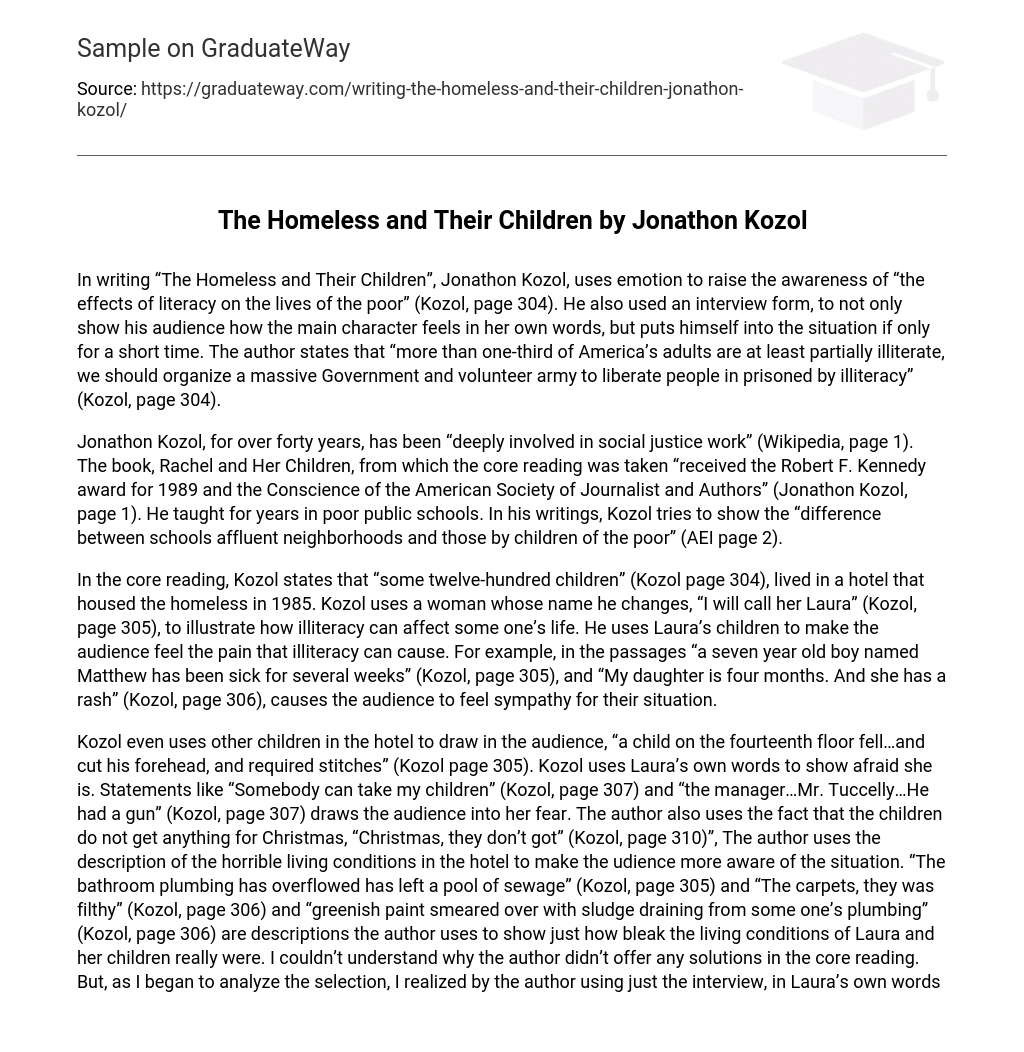Jonathon Kozol employs emotion in his writing, specifically in “The Homeless and Their Children”, to bring attention to the impact of literacy on the lives of the impoverished (Kozol, page 304). Additionally, he utilizes an interview format not only to convey the protagonist’s emotions in her own words, but also to immerse himself momentarily in the situation. The author argues that since over one-third of adults in America are partially illiterate, it is necessary to mobilize a large-scale governmental and volunteer effort to liberate those imprisoned by illiteracy (Kozol, page 304).
Jonathon Kozol has been engaged in social justice work for over forty years. According to Wikipedia, his book Rachel and Her Children, where the core reading was extracted from, earned him the Robert F. Kennedy award in 1989 and the Conscience of the American Society of Journalist and Authors. Kozol, who taught in impoverished public schools for many years, strives to illustrate the contrast between schools in affluent neighborhoods and those attended by underprivileged children, as stated on AEI’s page 2.
In the core reading, Kozol discusses the alarming fact that in 1985, “some twelve-hundred children” (Kozol page 304) resided in a hotel specifically designated for the homeless. To illustrate the impact of illiteracy on an individual’s life, Kozol presents the story of a woman, whom he identifies as “Laura” (Kozol, page 305). Kozol utilizes Laura’s children as an emotional tool to evoke empathy from the audience. For instance, Kozol shares how “a seven year old boy named Matthew has been sick for several weeks” (Kozol, page 305), and how Laura states, “My daughter is four months. And she has a rash” (Kozol, page 306). These details further compel the audience to sympathize with their plight.
Kozol captivates the audience by involving other children in the hotel, such as when one child fell on the fourteenth floor and needed stitches. This incident, as described by Kozol on page 305, serves to draw the readers’ attention. To convey Laura’s fear, Kozol directly quotes her, revealing statements like “Somebody can take my children” (Kozol, page 307) and “the manager…Mr. Tuccelly…He had a gun” (Kozol, page 307). These quotes effectively immerse the audience in her apprehension. Moreover, Kozol highlights how the children receive nothing for Christmas with the simple statement “Christmas, they don’t got” (Kozol, page 310). By emphasizing the poor living conditions in the hotel, the author raises awareness of the situation. Detailed descriptions like “The bathroom plumbing has overflowed has left a pool of sewage” (Kozol, page 305), “The carpets, they was filthy” (Kozol, page 306), and “greenish paint smeared over with sludge draining from someone’s plumbing” (Kozol, page 306) effectively depict the bleakness of Laura and her children’s living conditions. Although I initially wondered why the author did not propose any solutions in the core reading, upon further analysis, I realized that by solely presenting Laura’s interview in her own words, the author successfully evoked empathy from me towards her situation.
With her broken speech, Laura expresses her fears and embarrassment regarding her distressing life. She expresses concern about her ability to provide nourishment for her children, stating, “this week we don’t have food” (Kozol, page 307). Jonathon Kozol uses this anecdote to inspire his audience to take action and “awaken our nation from its apathetic indifference” (Jonathon Kozol, page 1). Through his writing, Kozol aims to raise awareness about the plight of the impoverished and motivate individuals to volunteer their time and effort towards addressing illiteracy. By doing so, these actions can significantly improve the lives of those affected. Jonathon Kozol continues his literary endeavors by addressing the issues of illiteracy and the deterioration of our educational institutions.
As stated on his Wikipedia page, he founded and presently manages the Cambridge Institute for Public Education, a non-profit organization. He not only urges others to participate in the battle against illiteracy but also actively involves himself in it. The writer effectively depicts the potential negative consequences of illiteracy, which can impact all aspects of an individual’s life. Through Laura’s personal story, readers are able to empathize with her difficult circumstances. This writing technique amplifies the genuineness of her situation and provides readers with a glimpse into her life.





